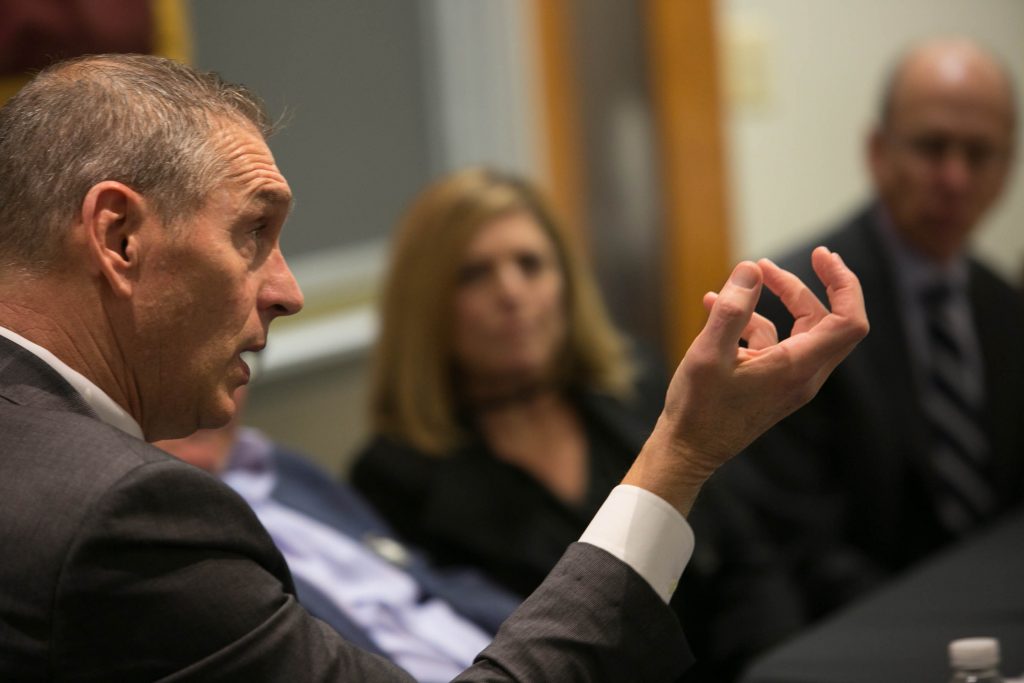The Rappaport Center for Law and Public Policy hosted its final program of the semester, “Creative Solutions to the Opioid Crisis,” at BC Law School on Nov. 15. Law enforcement, medical, policy, and mental and public health experts participated.
Professor R. Michael Cassidy, the Rappaport Center’s faculty director, opened the program by calling the opioid crisis “the public health emergency of our time.” He spoke of the need for stronger federal and state solutions in the face of the interrelated opioid and fentanyl epidemics.
US District Court Judge Leo T. Sorokin moderated the first of two panels, “Collaborative Initiatives Between Law Enforcement and Treatment Communities: What’s Working and What More Can We Be Doing?” He pointed to the often-overlooked relationship between the sale of drugs and the use of drugs and called for “more collaboration between the law enforcement and treatment communities.” By way of introducing Arlington Police Chief Fred Ryan (pictured above), Sorokin then highlighted an Arlington Police Department initiative to secure treatment for more drug users following arrests of drug dealers.
Chief Ryan called Arlington a microcosm of America’s opioid epidemic, and noted that in 2015 the city was experiencing an overdose death every month. The high death rate spurred the department to apply the lessons of domestic violence cases to the opioid epidemic. They used information from previous non-fatal overdoses to identify an at-risk population and began interventions and community outreach to develop short and long-term recovery plans for substance addicts and their families.
Ryan noted that for any arrest or search warrant targeting a dealer in a trafficking case “there must now be a parallel social services plan [for customers] to seize opportunities to get people help and into treatment rather than incarceration.” Ryan, who worked with the Gloucester Police Department’s Police Assisted Addiction and Recovery Initiative, was invited to the White House last October for a Presidential announcement about the national opioid crisis. He has since worked directly with US Surgeon General Jerome Adams developing collaborative federal policies.
Kim Hanton of the North Suffolk Mental Health Association praised recovery coaches in attendance and the integration of recovery coaching into law enforcement initiatives and clinic service models. “This is all about communication and relationships,” she said.
Finally, Gary Langis, from the Massachusetts Technical Assistance Partnership for Prevention (MassTAPP), praised the recent, positive changes in language, culture, prevention, and enforcement surrounding opioids. Langis began researching opioids in 1966 and once faced a 100-year prison sentence for operating a needle exchange program. He reminded the audience that “the opioid crisis has always been here, but it was contained in poor, urban, and minority areas.” He said that he and Chief Ryan sitting together at the panel is a sign of progress as is the fact that Massachusetts organizations and communities are leading the nation in innovative solutions.
The panelists took questions from the audience about drug court reform, synthetic opioids, Governor Baker’s proposed CARE Act, and unintended consequences of policies like the Health Insurance Portability and Accountability Act on preventative efforts.
Judge Sorokin wrapped up the first panel session stressing the continuing need for reform with a maxim he learned in drug court: “If you always do what you always did, you always get what you always got.”
The second panel, “Treatment Interventions Inside Prisons and Jails in Massachusetts and Rhode Island,” was moderated by the Boston Globe’s Felice Freyer. It featured Middlesex County Sheriff Peter Koutoujian; Massachusetts Department of Correction Assistant Deputy Commissioner of Reentry Christopher Mitchell; Rhode Island Department of Correction Director A.T. Wall; Associate Professor of Medicine and Director of Addiction Medicine Fellowship at Boston Medical Center/BU School of Medicine Dr. Alexander Walley; and Dr. Jennifer Clarke, medical programs director of the Rhode Island Department of Corrections.


